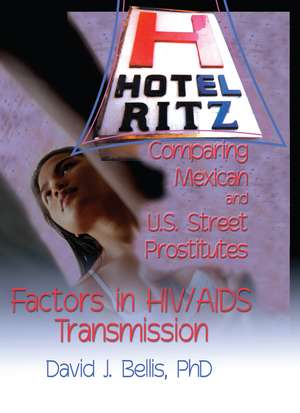Hotel Ritz - Comparing Mexican and U.S. Street Prostitutes: Factors in HIV/AIDS Transmission
Autor R. Dennis Shelby, David J Bellisen Limba Engleză Paperback – 6 mar 2003
This unique book draws on face-to-face interviews that the author conducted on the streets, with heroin-addicted street prostitutes in Southern California and their counterparts in four large Mexican cities.
Author David James Bellis illustrates the significant--and surprising--differences in the risk of exposure to HIV and other STDs that exist between street prostitutes in the two countries arising from national differences in the legality, sociology, and economics of sex work. He points out that Mexican prostitutes, for whom sex work is a simple means of livelihood, are “choir girls” compared with their beaten-up, drug-addicted sisters north of the border who perform sex for drug money and are at much greater risk of HIV and other diseases, like Hepatitis C. This book explores those differences, suggesting new directions for United States prostitution and heroin-control policies--laws currently so interwoven that they reinforce each other, accounting for a deadly circle of crime and disease.
In addition to the fascinating results of the author's interviews with 72 female street prostitutes in San Bernardino, California, and 102 more in Tijuana, Cd. Juárez, Cd. Victória, and Cuernavaca regarding their personal sexual, drug, and health practices, and their criminal histories, Hotel Ritz-Comparing Mexican and U.S. Street Prostitutes: Factors in HIV/AIDS Transmission explores:
- the licensing process for legal prostitutes in Mexico
- the medical testing that Mexico requires prostitutes to undergo
- the differences in what United States and Mexican prostitutes know about HIV transmission
- the difference in condom use between United States and Mexican prostitutes
- the potential benefits of reforming prostitution and drug laws in both countries
- the benefits of making methadone maintenence and syringes—and heroin—free for heroin-addicted prostitutes
- the proportion of United States/Mexican prostitutes who would quit the trade if they learned they had AIDS
- how the social support system in the United States (housing subsidies, TANF/AFDC money, food stamps, etc.) leads to a greater proportion of drug-addicted prostitutes than are found in Mexico
Preț: 236.54 lei
Nou
Puncte Express: 355
Preț estimativ în valută:
45.26€ • 46.77$ • 37.65£
45.26€ • 46.77$ • 37.65£
Comandă specială
Livrare economică 26 februarie-12 martie
Doresc să fiu notificat când acest titlu va fi disponibil:
Se trimite...
Preluare comenzi: 021 569.72.76
Specificații
ISBN-13: 9780789017765
ISBN-10: 0789017768
Pagini: 142
Dimensiuni: 152 x 212 x 10 mm
Greutate: 0.23 kg
Ediția:1
Editura: Taylor & Francis
Colecția Routledge
Locul publicării:Oxford, United Kingdom
ISBN-10: 0789017768
Pagini: 142
Dimensiuni: 152 x 212 x 10 mm
Greutate: 0.23 kg
Ediția:1
Editura: Taylor & Francis
Colecția Routledge
Locul publicării:Oxford, United Kingdom
Cuprins
- Preface
- Chapter 1. Introduction
- Theory, Research Design, and Study Limitations
- Mexican Study
- Main Drugs of Abuse and Injection Methods
- Concern of Street FSWs in Requiring Condom Use Compared to Ten Years Ago
- Chapter 2. Etiology of HIV Transmission
- Incidence and Prevalence of HIV/AIDS
- Hepatitis C (HCV), a Potentially More Serious Health Threat
- Reported AIDS Cases in Mexico
- The Relationship Between Commercial Sex Work, AIDS, and IDU
- Chapter 3. A Short History of Heroin and Commercial Sex Work
- Heroin
- Definitions of Prostitution
- History of Prostitution
- The FSW Hierarchy and the Bottom Rung of the Ladder
- Chapter 4. Study Setting and Methods
- Why Mexico?
- Why Particular Mexican Cities Were Chosen in Which to Interview Prostitutes
- The Tijuana Street Interview Experience
- FSW Interviews in Ciudad Juárez
- FSW Interviews in Ciudad Victoria, Tamaulipas
- Cuernavaca, Morelos: Another Interview Site
- Chapter 5. Findings: Comparing Mexican and San Bernardino Sex Workers
- Interview Research Questions
- Analysis and Discussion
- Chapter 6. Summary, Recommendation, and Conclusions
- Recommendations for Mexican FSWs
- Recommendations for American FSWs
- Conclusions
- Appendix. Survey Questionnaire
- References
- Index
Descriere
This unique book draws on nearly two hundred face-to-face interviews that the author conducted on the streets with heroin-addicted street prostitutes in Southern California and their counterparts in four large Mexican cities. It illustrates the significant—and surprising—differences in the risk of exposure to HIV and other STDs that exist between street prostitutes in the two countries; differences arising from the legality, sociology, and economics of sex work in each country. Helpful tables and an appendix containing the author's survey questions make the data in this well-referenced book easily understandable.
